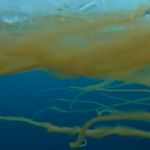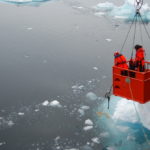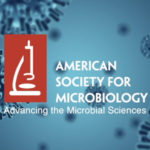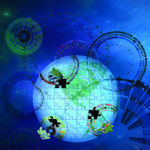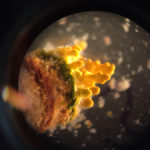In Nature Ecology and Evolution, researchers from the Chinese Academy of Fishery Sciences, the University of East Anglia, and the JGI have explored the genome of the polar algae Microglena sp. YARC. The green alga harbors extra genes for proteins requiring zinc, and those genes turn out to be key for the phytoplankton’s ability to live in cold polar waters. Learn more here on the JGI website.
JGI Helps Uncover How Climate Change Threatens the Base of Polar Oceans’ Food Webs
The cold polar oceans give rise to some of the largest food webs on Earth. And at their base are microscopic, photosynthetic algae. But human-induced climate change, a new study suggests, is displacing these important cold-water communities of algae with warm-adapted ones, a trend that threatens to destabilize the delicate marine food web and change the oceans as we know them.
The JGI Community Sequencing Program enabled the discovery of these worrisome circumstances for algal communities. Click here to read the news release on the JGI website.
Two from Biosciences Elected American Academy of Microbiology Fellows
Two Biosciences Area researchers—Natalia Ivanova and Susannah Tringe—are among 65 new Fellows elected into the American Academy of Microbiology’s 2021 class. An honorific leadership group within the American Society for Microbiology, the mission of the Academy is to provide microbiological expertise in the service of science and the public. Fellows are elected annually through a highly-selective peer-review process based on their records of scientific achievement and contributions in the field of microbiology.
JGI Leads Large-Scale Effort to Develop a Genomic Catalog of Earth’s Microbiomes
Microorganisms play key roles in regulating global nutrient cycles but only a small fraction has been identified and an even smaller number has been successfully cultured in a lab for study. In Nature Biotechnology, the known diversity of bacteria and archaea has now expanded by 44% through a publicly available collection of more than 52,000 microbial genomes from environmental samples. Of that number, 70% of the novel genome sequences were previously unknown, not yet cultured in the lab. The work results from a JGI-led collaboration involving more than 200 scientists around the world, KBase and NERSC. Read more about the genomic catalog of Earth’s microbiomes on the JGI website.
JGI Team Describes Host-Virus Dynamics In a Microbial Mat
Previous work on microbial mats had primarily relied on culturing virus and host pairs in the laboratory to study their interactions. In The ISME Journal, a team co-led by JGI postdoctoral researcher Mária Džunková used single-cell sequencing to sequence both a cell’s genome and detect accompanying viral sequences, which would suggest the virus had been infecting the cell. Read the full story on the JGI website.
Was this page useful?


